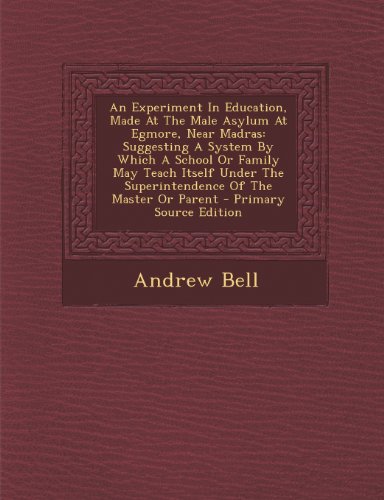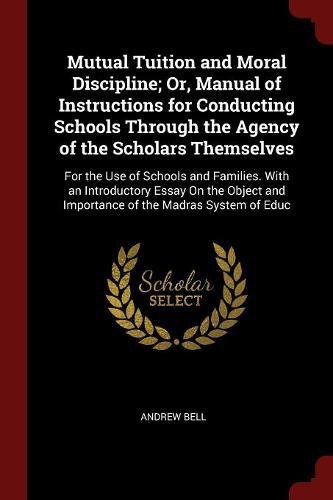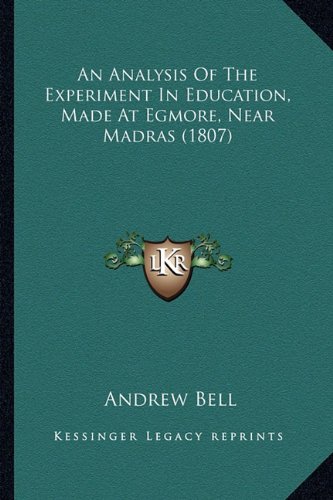Background
Andrew Bell was born in St. Andrews on March 27, 1753.



( This is a reproduction of a book published before 1923....)
This is a reproduction of a book published before 1923. This book may have occasional imperfections such as missing or blurred pages, poor pictures, errant marks, etc. that were either part of the original artifact, or were introduced by the scanning process. We believe this work is culturally important, and despite the imperfections, have elected to bring it back into print as part of our continuing commitment to the preservation of printed works worldwide. We appreciate your understanding of the imperfections in the preservation process, and hope you enjoy this valuable book. ++++ The below data was compiled from various identification fields in the bibliographic record of this title. This data is provided as an additional tool in helping to ensure edition identification: ++++ An Experiment In Education, Made At The Male Asylum At Egmore, Near Madras: Suggesting A System By Which A School Or Family May Teach Itself Under The Superintendence Of The Master Or Parent 2 Andrew Bell Printed for Cadell and Davies, by T. Bensley, 1805 Education; History; Education; Education / History; Monitorial system of education
http://www.amazon.com/gp/product/1289705623/?tag=2022091-20

( This work has been selected by scholars as being cultur...)
This work has been selected by scholars as being culturally important, and is part of the knowledge base of civilization as we know it. This work was reproduced from the original artifact, and remains as true to the original work as possible. Therefore, you will see the original copyright references, library stamps (as most of these works have been housed in our most important libraries around the world), and other notations in the work. This work is in the public domain in the United States of America, and possibly other nations. Within the United States, you may freely copy and distribute this work, as no entity (individual or corporate) has a copyright on the body of the work. As a reproduction of a historical artifact, this work may contain missing or blurred pages, poor pictures, errant marks, etc. Scholars believe, and we concur, that this work is important enough to be preserved, reproduced, and made generally available to the public. We appreciate your support of the preservation process, and thank you for being an important part of keeping this knowledge alive and relevant.
http://www.amazon.com/gp/product/137563254X/?tag=2022091-20

(This scarce antiquarian book is a facsimile reprint of th...)
This scarce antiquarian book is a facsimile reprint of the original. Due to its age, it may contain imperfections such as marks, notations, marginalia and flawed pages. Because we believe this work is culturally important, we have made it available as part of our commitment for protecting, preserving, and promoting the world's literature in affordable, high quality, modern editions that are true to the original work.
http://www.amazon.com/gp/product/1164567217/?tag=2022091-20
Andrew Bell was born in St. Andrews on March 27, 1753.
In 1769 he entered St. Andrews University, where he excelled in mathematics and natural philosophy. He graduated in 1774.
After serving from 1774 to 1781 as a private tutor in the Virginia Colony, he returned to Scotland, where he continued tutoring and was ordained a clergyman in the Anglican Church.
Bell sailed for India in 1787. He was appointed superintendent of the Madras Male Orphan Society, where he developed the Madras system, which became his lifework and made him a leading figure in English education.
At the Madras school little progress was being made because neither the teachers nor the pupils showed any interest in learning. One day Bell came upon a local school where the native children were learning the alphabet by writing with their fingers in the sand. Fascinated by both the method and the zest of the children, Bell tried to introduce sand boards into his school, but the teachers resisted. Never easily thwarted, Bell chose an advanced student to teach the others. This use of students to instruct other students was the heart of the Madras system.
In 1791 Bell returned to London and later published a pamphlet, An Experiment in Education (1797), discussing his methods and views of the Madras system. This plan received little public notice until Joseph Lancaster opened a school which was conducted in accordance with Bell's principles but improved upon the system. By the turn of the century the Madras system, also known as the Bell-Lancaster system, had become popularized, and Bell was asked to organize a school system in Dorset. In 1811 he became superintendent of the National Society for Promoting the Education of the Poor in the Principles of the Established Church.
The successful spread of the Madras system was due to a number of factors. It was inexpensive, was relatively efficient, and appeared at a time when interest in social reform, especially the education of poor children, was at a height in England.
Though most famous for the Madras system, Bell was also interested in the abolition of corporal punishment of children, more active learning situations in schools, and other practices far ahead of his time. On Jan. 27, 1832, after a lifetime of service to education, Bell died, and he was buried in Westminster Abbey.
( This work has been selected by scholars as being cultur...)
(This scarce antiquarian book is a facsimile reprint of th...)
( This is a reproduction of a book published before 1923....)
He was a Fellow of the Royal Society of Edinburgh and a Fellow of the Royal Asiatic Society of Great Britain and Ireland.
Bell was a fanatical enthusiast for his system and an intolerant man. He was difficult to deal with and hard to work under. Nevertheless, he always got on well with children.
He married Agnes, daughter of a Dr George Barclay in December 1801.
